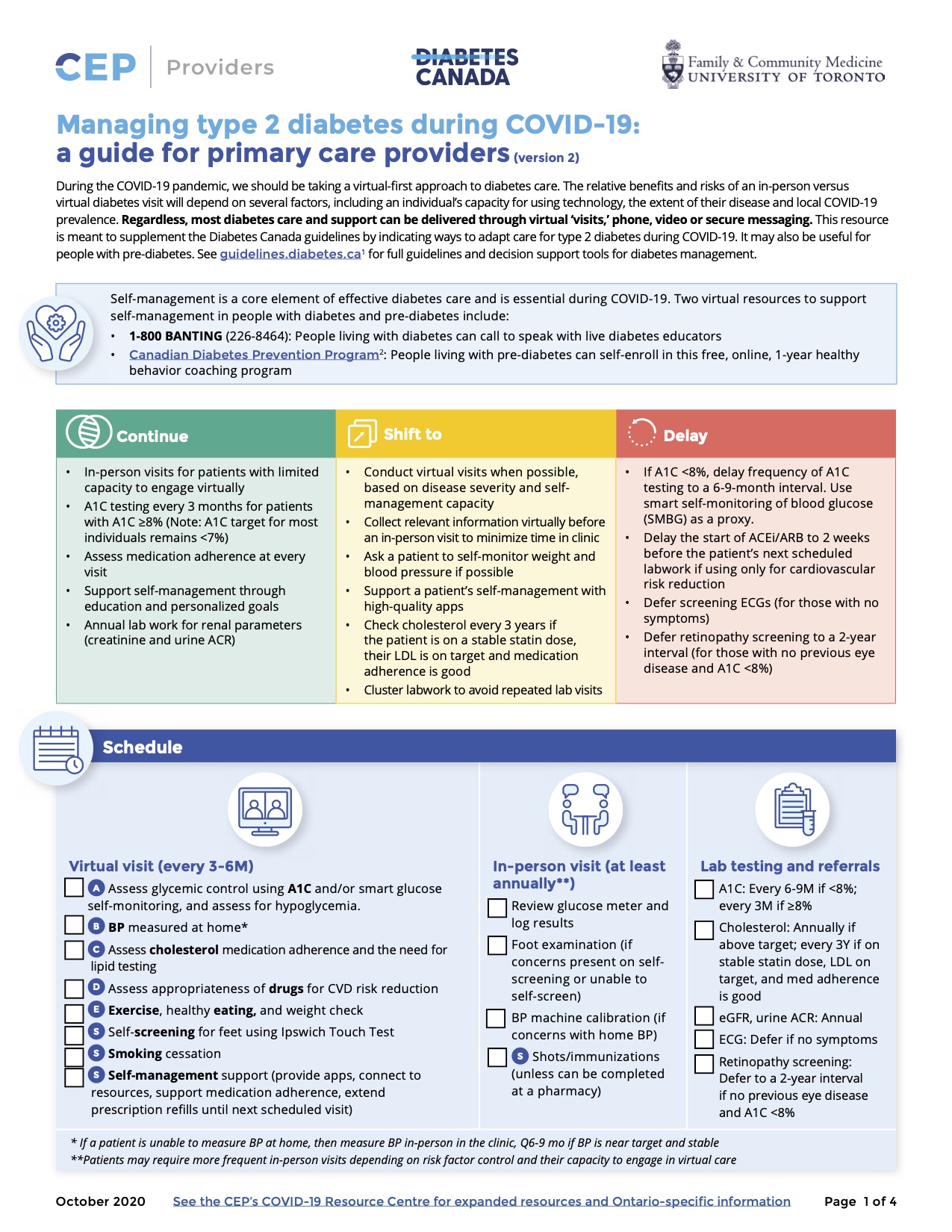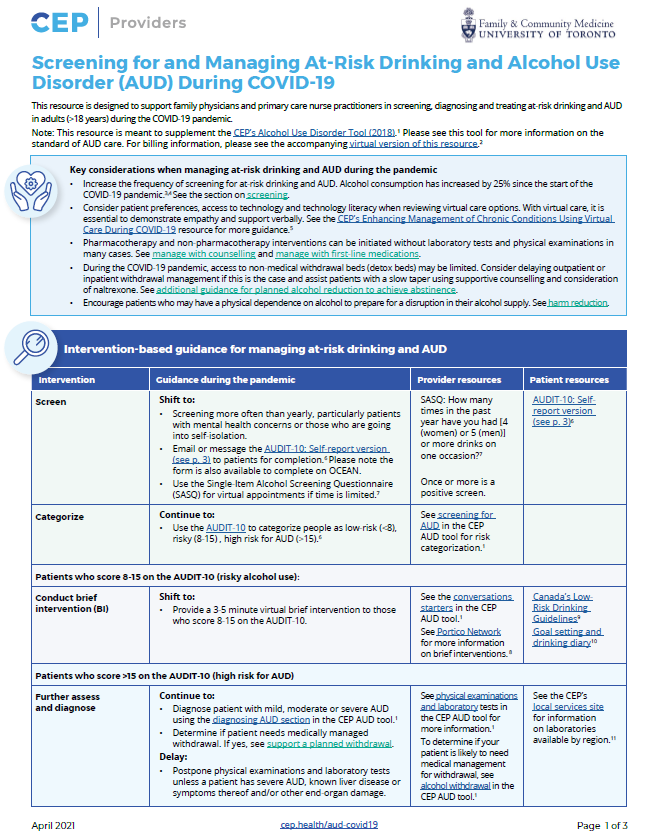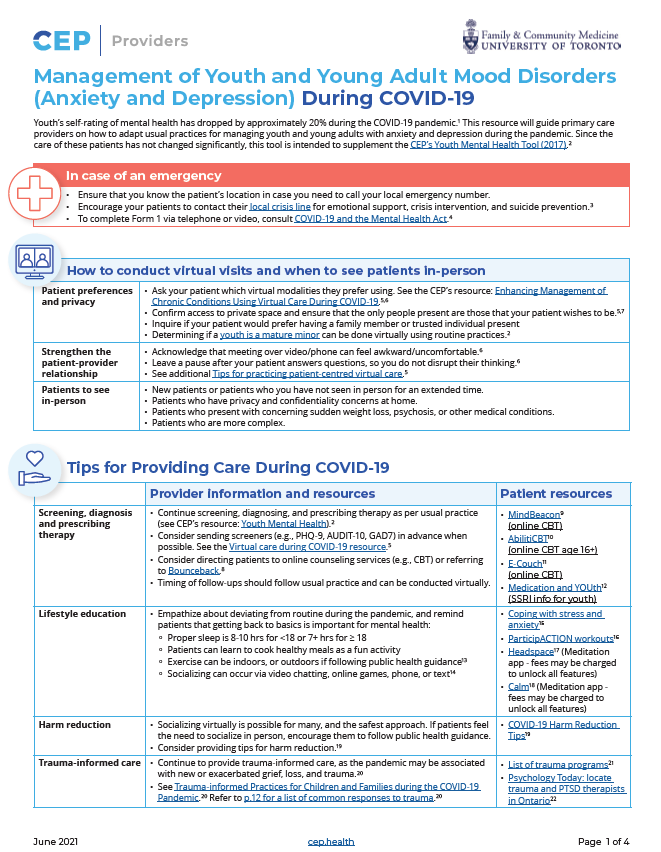Breadcrumbs
Balancing In-Person and Virtual Care
In May 2020, the Quality & Innovation Program initiated a collaboration with the Centre for Effective Practice (CEP) to develop a series of tools that provide guidance to primary care professionals on how to take a virtual-first approach to safely and effectively managing chronic conditions during the COVID-19 pandemic and beyond. Our first tool was launched in July 2020 and focused on managing diabetes care, one of the most common conditions seen in primary care. The tool was accompanied by an article in Canadian Family Physician providing national dissemination. Since then, we have published a tool providing practical guidance on incorporating both synchronous and asynchronous virtual visits in practice as well as tools for alcohol use disorder and youth mental health, two conditions that have been exacerbated by the COVID-19 pandemic. Our latest tool supports the management of COPD.
Each tool has been led by a DFCM faculty member and informed by a working group and advisory committee that includes DFCM faculty but also primary care clinicians, patients and experts across the province. We anticipate this guidance will provide a foundation for how primary care practices can continue to incorporate virtual care into practice post-pandemic.
Explore some of the tools further below.
A virtual-first approach to managing type 2 diabetes during COVID-19
Effective management of chronic conditions remains an important part of primary care but how deliver that care has had to change during the pandemic. This practical guidance published in Canadian Family Physician provides practical tips for what aspects of diabetes care should stay the same, what needs to change, and what can stop during the pandemic. It provides a recommended management schedule and points clinicians to helpful resources for their patients. The guidance was developed by faculty from the University of Toronto Department of Family and Community Medicine in partnership with Diabetes Canada and the Centre for Effective Practice to develop practical guidance.
A full copy of the recommendations for family doctors is available at https://cep.health/clinical-products/type-2-diabetes/ and the accompanying article is available at: https://www.cfp.ca/content/66/10/745
Managing chronic conditions using virtual care during COVID-19
Virtual care is any remote interaction between patients and their circle of care, involving the use of phone, video, email or secure messaging. With some upfront time and effort, virtual care can lead to a more efficient practice and better quality of care both during the pandemic and after. This resource is designed to improve provider confidence in implementing virtual care to support quality chronic disease management.
Using virtual care for chronic disease management can help you:
-
Save time by avoiding visits to titrate medications or track side effects by collecting information on symptoms and risk factor control through email/secure messaging.
-
Shorten or reduce follow up visits for chronic disease management by sending educational resources and plans for escalation of care.
-
Save administrative staff time by using email/secure messaging for preventive care (vaccinations, OBSP, CRC screening) and recalling patients for overdue visits.
The 'Enhancing Management of Chronic Conditions Using Virtual Care During COVID-19' resource, developed by the Centre for Effective Practice and DFCM is available for download.
Screening and Managing At-Risk Drinking and Alcohol Use Disorder During COVID-19
Alcohol consumption has increased by 25% since the start of the COVID-19 pandemic. This resource is designed to support family physicians and primary care nurse practitioners in screening, diagnosing and treating at-risk drinking and Alcohol Use Disorder (AUD) in adults (>18 years) during the COVID-19 pandemic.
Developed by the Centre for Effective Practice in partnership with the University of Toronto's Department of Family and Community Medicine and other provincial stakeholders, this resource can help providers leverage virtual care in order to save time while enhancing patients’ lives. It highlights a variety of methods to help address alcohol risk and AUD including recommended frequency for screening, patient preferences, pharmacotherapy and non-pharmacotherapy options and more. It also lists key patient resources to help provide patient-centred care efficiently.
Screening and Managing At-Risk Drinking and Alcohol Use Disorder (AUD) During COVID-19 tool
Management of Youth and Young Adult Mood Disorders During COVID-19
Youth’s self-rating of mental health has dropped by approximately 20% during the COVID-19 pandemic. This resource will guide primary care providers on how to adapt usual practices for managing youth and young adults with anxiety and depression during the pandemic.
Developed by the Centre for Effective Practice in partnership with the University of Toronto's Department of Family and Community Medicine with support of other provincial stakeholders, this resource will guide primary care providers on how to adapt usual practices for managing youth and young adults with anxiety and depression during the pandemic. This tool is intended to supplement the CEP’s Youth Mental Health Tool (2017).
Management of Youth and Young Adult Mood Disorders (Anxiety and Depression) During COVID-19 tool



